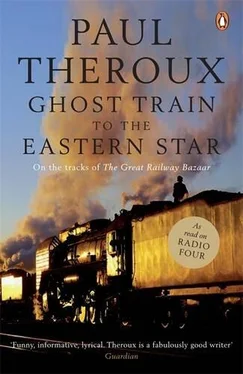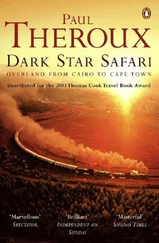Older people are perceived as cynics and misanthropes — but no, they are simply people who have at last heard the still, sad music of humanity played by an inferior rock band howling for fame. Going back and retracing my footsteps — a glib, debunking effort for a shallower, younger, impressionable writer — would be for me a way of seeing who I was, where I went, and what subsequently happened to the places I had seen.
Since I will never write the autobiography I once envisioned — volume one, Who I Was; volume two, I Told You So —writing about travel has become a way of making sense of my life, the nearest I will come to autobiography — as the novel is, the short story, and the essay. As Pedro Almodóvar once remarked, "Anything that is not autobiography is plagiarism."
The thing to avoid while in my own footsteps would be the tedious reminiscences of better days, the twittering of the nostalgia bore, whose message is usually I was there and you weren't. "I remember when you could get four of those for a dollar." "There was a big tree in a field where that building is now." "In my day…"
Oh, shut up!
***
WHAT TRAVELER BACKTRACKED to take the great trip again? None of the good ones that I know. Greene never returned to the Liberian bush, nor to Mexico, nor to Vietnam. In his late fifties, Waugh dismissed modern travel altogether as mere tourism and a waste of time. After 1948, Thesiger did not return to Rub' al Khali, the Empty Quarter of Arabia. Burton did not mount another expedition to Utah, or to substantiate the source of the Nile — at my age he was living in Trieste, immersed in erotica. Darwin never went to sea again. Neither did Joseph Conrad, who ended up hating the prospect of seafaring. Eric Newby went down the Ganges once, Jonathan Raban down the Mississippi once, and Jan Morris climbed Everest once. Robert Byron did not take the road to Oxiana again, Cherry-Garrard made only one trip to Antarctica, Chatwin never returned to Patagonia, nor did Doughty go back to Arabia Deserta, nor Wallace to the Malay Archipelago, nor Waterton to the Amazon, nor Trollope to the West Indies, nor Edward Lear to Corsica, nor Stevenson to the Cévennes, nor Chekhov to Sakhalin, nor Gide to the Congo, nor Canetti to Marrakesh, nor Jack London to the Solomon Islands, nor Mark Twain to Hawaii. So much for some of my favorite authors.
You could ask, "Why should they bother?" but the fact is that each of these travelers, grown older, would have discovered what the heroic traveler Henry Morton Stanley found when he recrossed Africa from west to east ten years after his first successful crossing from east to west from 1874 to 1877—a different place, with ominous changes, and a new book. Richard Henry Dana added a chastened epilogue to Two Years Before the Mast when, twenty-four years after its publication in 1840, he returned to San Francisco (but no longer traveling in the forecastle) and found that it had changed from a gloomy Spanish mission station with a few shacks to an American boom town that had been transformed by the Gold Rush. Dana was scrupulous about reacquainting himself with people he'd met on his first visit and sizing up the altered landscape, completing, as he put it, "acts of pious remembrance."
Certain poets, notably Wordsworth and Yeats, enlarged their vision and found enlightenment in returning to an earlier landscape of their lives. They set the standard in the literature of revisitation. If it is a writer's lot to repeat the past, writing it in his or her own way, this return journey might be my own prosaic version of "The Wild Swans at Coole" or "Tintern Abbey."
My proposed trip to retrace the itinerary of The Great Railway Bazaar was mainly curiosity on my part, and the usual idleness, with a hankering to be away; but this had been the case thirty-three years before, and it had yielded results. All writing is launching yourself into the darkness, and hoping for light and a soft landing.
"I'm going to do a lot of knitting while you're away," my wife said. That was welcome news. I needed Penelope this time.
Though I had pretended to be jolly in the published narrative, the first trip had not gone as planned.
"I don't want you to go," my first wife had said in 1973—not in a sentimental way, but as an angry demand.
Yet I had just finished a book and was out of ideas. I had no income, no idea for a new novel, and — though I didn't know what I was in for — I hoped that this trip might be a way of finding a subject. I had to go. Sailors went to sea, soldiers went to war, fishermen went fishing, I told her. Writers sometimes had to leave home. "I'll be back as soon as I can."
She resented my leaving. And though I did not write about it, I was miserable when I set off from London, saying goodbye to this demoralized woman and our two small children.
It was the age of aerograms and postcards and big black unreliable telephones. I wrote home often. But I succeeded in making only two phone calls, one from New Delhi and another from Tokyo, both of them futile. And why did my endearments sound unwelcome? I was homesick the whole way — four and a half months of it — and wondered if I was being missed. That was my first melancholy experience of the traveler's long lonely evenings. I was at my wits' end on the trip. I felt insane when I got home. I had not been missed. I had been replaced.
My wife had taken a lover. It was hypocritical of me to object: I had been unfaithful to her. It wasn't her sexual exploit that upset me, but the cozy domesticity. He spent many days and nights in my house, in our bed, romancing her and playing with the children.
I did not recognize my own voice when I howled, "How could you do this?"
She said, "I pretended you were dead."
I wanted to kill this woman, not because I hated her, but (as homicidal spouses often say) because I loved her. I threatened to kill the man who, even after I was home, sent her love letters. I became an angry brute, and by chance I discovered a wickedly helpful thing: threatening to kill someone is an effective way of getting a person's attention.
Instead of killing anyone, or threatening it anymore, I sat in my room and wrote in a fury, abusing my typewriter, trying to lose myself in the book's humor and strangeness. I had a low opinion of most travel books. I wanted to put in everything that I found lacking in the other books — dialogue, characters, discomfort — and to leave out museums, churches, and sightseeing generally. Though it would have added a dimension, I concealed everything about my domestic turmoil. I made the book jolly, and like many jolly books it was written in an agony of suffering, with the regret that in taking the trip I had lost what I valued most: my children, my wife, my happy household.
The book succeeded. I was cured of my misery by more work — an idea I had on the trip for a new novel. Yet something had been destroyed: faith, love, trust, and a belief in the future. After my travel, on my return, I became an outsider, a ghostly presence, with my nose pressed against the window. I understood what it was like to be dead: people might miss you, but their lives go on without you. New people take your place. They sit in your favorite chair and dandle your children on their knees, giving them advice, chucking them under the chin; they sleep in your bed, look at your paintings, read your books, flirt with the Danish nanny; and as they belittle you for having been an overindustrious drudge, they spend your money. Most of the time, your death is forgotten. "Maybe it was for the best," people say, trying not to be morbid.
Some betrayals are forgivable, but others you never quite recover from. Years later, when my children were out of the house, I left that life, that marriage, that country. I began a new life elsewhere.
Читать дальше












